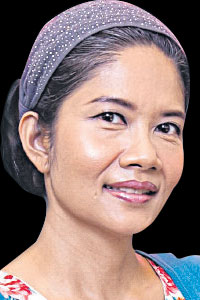Mahatma Gandhi once said: "It is health that is real wealth and not pieces of gold and silver".
While I agree with this quote, many of us are still in poor health because of a hectic and imbalanced life as we work hard to make money while overlooking our wellness.
Once a silent disease strikes, we end up using our savings to pay for medical bills instead.
Approaching World Health Day, which falls on April 7 every year, we can review how we have invested in our health -- the real wealth.
Do we eat a balanced diet? Do we regularly work out? Do we go to bed before 11pm?
I guess I have bad habits to break to get back on the road to good health, otherwise, I would have to pay a price for the neglect.
Mahatma Gandhi stressed this in the introduction to A Guide To Health, translated from Hindi by A Rama Iyer, M.A. and published by S Ganesan in 1921.
Gandhi believed that it is easier and safer to prevent than cure illness brought on by our own ignorance and carelessness.
Ignorance is one of the root causes of disease, he emphasised, and it also leads to adopting the wrong remedies.
He even pointed out that people are more interested and acknowledge matters that are far from them but hardly know anything about things near or closest to them, including their body.
Back in the early 1920s, the book's translator noted that Mahatma Gandhi is an authority on health and disease, whose views are radically different from others. His revolutionary doctrines may seem impracticable but they are based on his study and backed up by personal experience.
While it has been a century since the book was released, the Gandhian tenets of good health remain relevant to this day and age.
Merely the introduction is an enlightening read, while the following contents provide a general knowledge of health and simple treatments.
Gandhi's holistic approach is expressed in his definition of health. Only with a sound mind in a sound body can a person really be healthy, however, it is hard to attain this level of good health and even harder still to maintain it.
As it is a duty to strive for perfect health, he advises us how to do it, such as in the chapter on how much and how many times should we eat?
The system of four meals -- breakfast, lunch, dinner and supper -- is related to the invention of Western medicine, which would be taken qd, bid, tid or qid according to the doctor's prescription.
However, his advice for adults is that there is absolutely no need to eat more than twice a day. He also believes in fasting and doing so at least once a fortnight is beneficial for health.
Regarding quantity, people tend to eat more than required and there's a need to reduce food intake. Most important is to masticate thoroughly in order to extract maximum nutrients from the minimum amount of food.
The chapter on exercise reinforces how "a sound mind in a sound body" constitutes true health. Gandhi defined exercise, involving both physical and mental activities, as a vital necessity as much as air, water and food.
One of the simplest forms of exercise is walking at least 16km. The Indian visionary leader walked his talk and is said to have walked 18km a day for nearly 40 years.
Following the laws of health, which include other practices besides the recommended diet and exercise, will keep physical illnesses and mental disorders at bay.
However, with the advent of modern medicine there has been a change in the mindset as people now prefer to take a shortcut by taking pills and supplements to counteract the outcome of our bad habits.
Instead of depending on drugs, doctors and hospitals for healthcare, Gandhi believed in the self-care and natural remedies such as a change of air, water cure and the use of earth, elaborated in the second part of A Guide To Health.
For people who are not well-off, the dependency often comes with the inequity, as they have less access to health services. This is addressed in the World Health Day 2021 campaign, themed "Building a fairer, healthier world".
But above all, prevention is better than cure and maintaining good health through the Gandhian way of life is a self-reliant DIY project.
Kanokporn Chanasongkram is a feature writer for Life section of the Bangkok Post.
